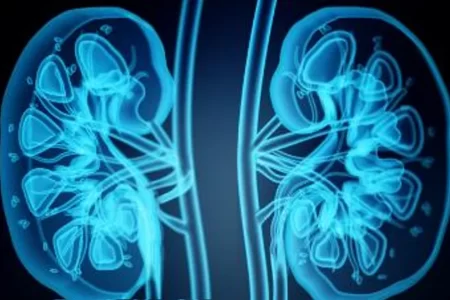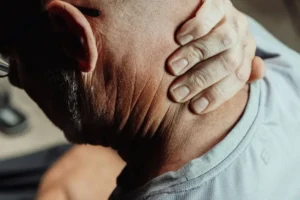Understanding Post-Kidney Stone Surgery Pain
- Updated on: Dec 23, 2023
- 4 min Read
- Published on Dec 23, 2023

What is Post-Kidney Stone Surgery Pain?
Kidney stone surgery, known medically as lithotripsy or ureteroscopy, is a procedure to remove stones from the kidney or urinary tract. Post-surgery pain, a common aftermath, varies in intensity and duration based on the type of surgery, the size and location of the stone, and individual pain tolerance.

Types of Kidney Stone Surgeries and Associated Pain
Lithotripsy
This non-invasive procedure uses shock waves to break kidney stones into smaller fragments. Post-procedure, patients may experience abdominal or back pain as the stone fragments pass through the urinary tract.
Ureteroscopy
Here, a thin scope is inserted through the urethra to remove the stones. Post-operative pain can be felt in the abdomen, back, or genital area due to ureter manipulation.
Understanding Pain After Surgery
Causes of Pain
Passage of Stone Fragments: Small pieces of stone passing through the urinary tract can cause discomfort.
Ureteral Swelling: The ureter may swell after surgery, leading to pain.
Irritation from Surgery: The surgical area can be irritated, causing temporary discomfort.
Pain Severity
The intensity of pain can range from mild to severe and usually peaks within the first few days post-surgery.
Duration of Pain
Generally, pain decreases in intensity over a few days to a week. However, it can last longer depending on individual healing rates and surgery complexity.
Managing Pain After Kidney Stone Surgery
Medications
Over-the-Counter Pain Relievers: Medications like ibuprofen or acetaminophen can be effective.
Prescription Pain Medication: In some cases, stronger pain relief may be prescribed by your doctor.
Home Remedies
Heat Therapy: Applying a warm compress to the affected area can reduce muscle tension and pain.
Hydration: Drinking plenty of water helps to flush out stone fragments and reduce pain during urination.
Physical Activity
Light activities are encouraged, but strenuous exercise should be avoided until fully recovered.
When to Contact Your Doctor
While post-surgical pain is normal, there are signs that warrant immediate medical attention:
Intense or Increasing Pain: If the pain becomes unbearable or worsens, it may indicate complications.
Fever and Chills: These symptoms could suggest an infection.
Difficulty Urinating: This might indicate a blockage or swelling in the urinary tract.
Tips for a Smooth Recovery
Follow Doctor’s Instructions
Adhere to any specific post-operative care guidelines provided by your healthcare provider.
Monitor Your Symptoms
Keep track of your pain levels and any other symptoms that arise during recovery.
Rest and Recuperate
Ensure you get enough rest to aid the healing process.
Stay Hydrated
Drinking water is crucial for helping your body recover and preventing future kidney stones.
Dietary Adjustments
Adapting your diet to include more fluids and less salt can aid recovery and prevent stone recurrence.
Long-term Management
To prevent future kidney stones and associated surgeries, consider:
Regular Health Check-ups: Keep up with your healthcare appointments.
Dietary Changes: A diet low in sodium and rich in calcium can help prevent stone formation.
Staying Hydrated: A key factor in preventing kidney stones.
The bottom line
Understanding and managing post-kidney stone surgery pain is a vital part of your recovery journey. By being aware of what to expect, how to manage discomfort, and when to seek medical advice, you can navigate your recovery with confidence. Remember, every patient’s experience is unique, and it’s important to communicate with your healthcare provider about any concerns or complications you face during your recovery.
If you have undergone kidney stone surgery, remember that post-operative pain is a normal part of the healing process. With the right care and attention, you can manage this pain effectively and make a smooth transition back to your daily life.
FAQs
How long does post-kidney stone surgery pain last, and what can I do to manage it?
Post-kidney stone surgery pain typically lasts a few days to a week. To manage it, follow your doctor's prescribed pain medication regimen, stay hydrated, and rest. Applying a heating pad and avoiding strenuous activities can also help alleviate discomfort.
Is it normal to experience pain after kidney stone removal surgery?
Yes, it's normal to experience some pain after kidney stone removal surgery. This is often due to the natural healing process and the body's response to the procedure. However, if the pain is severe or prolonged, consult your healthcare provider for further evaluation.
Can over-the-counter pain relievers help with post-kidney stone surgery pain?
Over-the-counter pain relievers may offer mild relief, but it's crucial to follow your doctor's recommendations regarding prescribed medications. Consult your healthcare provider before using over-the-counter options to avoid potential interactions or adverse effects.
What dietary changes can I make to prevent future kidney stones after surgery?
To prevent future kidney stones, consider reducing sodium intake, staying well-hydrated, and adopting a diet rich in fruits and vegetables. Your healthcare provider may also recommend dietary modifications based on the specific type of kidney stones you've had.
How soon can I resume normal activities after kidney stone surgery?
The timeframe for resuming normal activities varies, but most individuals can gradually return to regular activities within a week or as advised by their healthcare provider. It's essential to listen to your body, avoid strenuous activities initially, and follow your post-operative care instructions for a smoother recovery.












